Elizabeth Falconer (born July 20, 1956) is one of the few American masters of the koto , a traditional zither from Japan. Unusually, she is licensed in two koto schools in Japan. She began playing the koto in 1979. She earned a junshihan (associate degree) from the Seiha Koto School, studying under Nagane Utayumi. This school focused on classical works. She later moved to Tokyo and studied under the esteemed Sawai Kazue and Sawai Tadao at the Sawai Koto School, and earned a Shihan (master's license) at the Sawai Koto School, which focuses on contemporary works. She is an admirer of the work of Sawai Kazue.
Falconer holds a BA in Japanese Studies from the University of Oregon, an MA in Japanese Pedagogy, and a PhD in International Education, writing her dissertation on koto teaching methods in Japan. Her works for koto are published in Japan. She has earned numerous awards for her work combining Japanese folktales with original koto music and has produced over 10 albums on her label, Koto World.
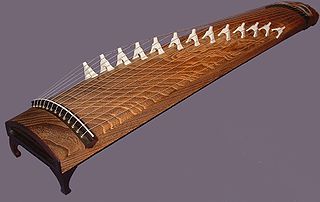
The koto is a Japanese plucked half-tube zither instrument, and the national instrument of Japan. It is derived from the Chinese zheng and se, and similar to the Mongolian yatga, the Korean gayageum and ajaeng, the Vietnamese đàn tranh, the Sundanese kacapi and the Kazakh jetigen. Koto are roughly 180 centimetres (71 in) in length, and made from Paulownia wood. The most common type uses 13 strings strung over movable bridges used for tuning, different pieces possibly requiring different tuning. Seventeen-string koto are also common, and act as bass in ensembles. Koto strings are generally plucked using three fingerpicks, worn on the first three fingers of the right hand.

Tokyo University of the Arts or Tokyogeidai (東京芸大) is a school of art and music in Japan. Located in Ueno Park, it also has facilities in Toride, Ibaraki, Yokohama, Kanagawa, Kitasenju and Adachi, Tokyo. The university has trained renowned artists in the fields of painting, sculpture, crafts, inter-media, sound, music composition, traditional instruments, art curation and global arts.
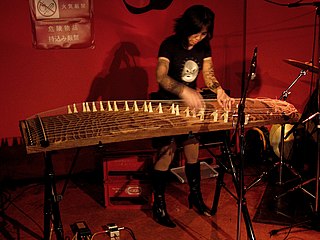
Michiyo Yagi, a Japanese musician who studied koto under Tadao Sawai, Kazue Sawai and Satomi Kurauchi, and graduated from the NHK Professional Training School for Traditional Musicians. Between 1989 and 1990, during her tenure as visiting professor of music at Wesleyan University in Connecticut, U.S.A., she premiered numerous modern compositions for koto and came under the influence of maverick American composers such as John Cage, Conlon Nancarrow, and John Zorn. Her solo koto CD Shizuku was produced by Zorn and released on the Tzadik label in 1999. In 2001 she recorded "Yural" with her koto ensemble Paulownia Crush for the East Works label. Under the auspices of the Japan Foundation, Yagi toured Russia with this ensemble in the fall of 2004.
Etta Zuber Falconer was an American educator and mathematician the bulk of whose career was spent at Spelman College, where she eventually served as department head and associate provost. She was one of the earlier African-American women to receive a Ph.D. in mathematics.
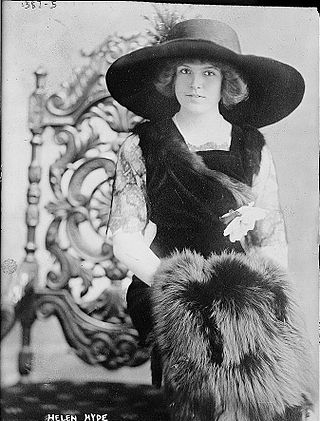
Helen Hyde was an American etcher and engraver. She is best known for her color etching process and woodblock prints reflecting Japanese women and children characterizations.
Violet Kazue de Cristoforo was a Japanese American poet, composer and translator of haiku. Her haiku reflected the time that she and her family spent in detention in Japanese internment camps during World War II. She wrote more than a dozen books of poetry during her lifetime. Her best known works are Poetic Reflections of the Tule Lake Internment Camp, 1944, which was written nearly 50 years after her detention and May Sky: There Is Always Tomorrow; An Anthology of Japanese American Concentration Camp Kaiko Haiku, for which she was the editor.
Hiromi Ōta is a Japanese female singer. She is a popular singer who is considered an idol in Japan during the 1970s, and is thought to be representative of that era. She also collaborated with the composer-musician Ayuo and the Japanese koto player Kazue Sawai singing a unique blend of New Age, Classical and traditional Eastern music. Her collaborations with Ayuo were also released in the US on the CD "Red Moon" on Tzadik label.
Mariko Iwadate is a Japanese manga artist.
Kazue Sawai is a Japanese koto player noted for her performance of contemporary classical music and free improvisation.
Tadao Sawai was a Japanese koto player and composer. He was renowned all over Japan for his skill at the koto and also received acclaim for his compositions. He was married to Kazue Sawai, also a koto player, and their son Hikaru Sawai is also a musician.
Hikaru Sawai is a Japanese koto player and composer. He is the son of the Kazue Sawai and late Tadao Sawai, both of whom are also renowned as koto players and composers.
Reiko Obata is a Japanese-American koto performer and composer, based in Southern California, United States.

Mari Takano is a Japanese composer, pianist, essayist, and teacher. Takano's work, and musical voice, has been recognized as among the most distinctive to be found amid Japanese composers of the "post-Takemitsu generation".

Ayuo Takahashi is a Japanese-born American composer, poet, lyricist, singer, and performer of plucked string instruments including guitar, bouzouki, Irish harp, Chinese zheng, Japanese koto, and medieval European psaltery. He is adept at adapting the ancient music of Japan, China, Persia, Greece, and medieval Europe to create a new and original music without abandoning their strict forms while simultaneously making them relevant to contemporary music styles. He has composed for classical ensembles including string quartets, piano, various chamber ensembles, and orchestra, as well as composed, produced and performed with rock, jazz and musicians of various traditional music from around the world. He has also composed many music theater pieces, some of which has been released on CD in the United States and Japan.

Kyousougiga is a Japanese original net animation (ONA) series created by Izumi Todo and produced by Toei Animation in collaboration with Banpresto. The animation was released on Nico Nico Douga and YouTube in December 2011. Five additional episodes were streamed between August and December 2012. An anime television series aired between October and December 2013.
Kazue Togasaki was one of the earliest women with Japanese ancestry to earn a medical degree in the United States.

Chen Chin, also written as Ch'en Chin, was a Taiwanese painter, known for her paintings of women (bijin). She is said to be the first Taiwanese woman painter to earn national recognition.
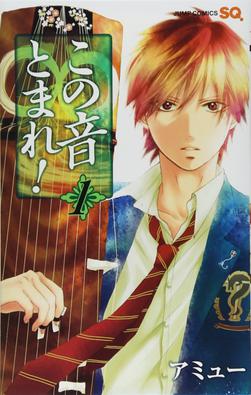
Kono Oto Tomare! Sounds of Life is a Japanese manga series written and illustrated by Amyu. The series began publication in Shueisha's Jump Square magazine in August 2012. It has been reported that over 5.5 million copies of the manga have been sold. An anime television series adaptation produced by Platinum Vision aired from April to December 2019.
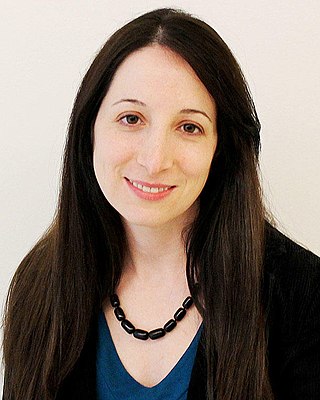
Elizabeth Khaykin Cahoon is a Georgian-born American epidemiologist researching cancer and precancer risks conferred by environmental sources of radiation exposure. She is a Stadtman investigator at the National Cancer Institute.
Kazue Morisaki was a Japanese poet and nonfiction writer. She is best known for her 1976 book Karayuki-san (からゆきさん).